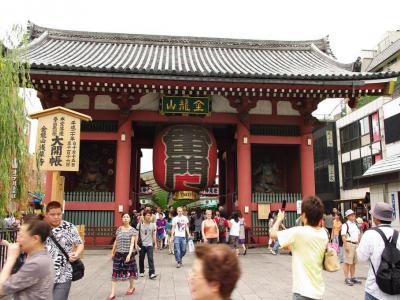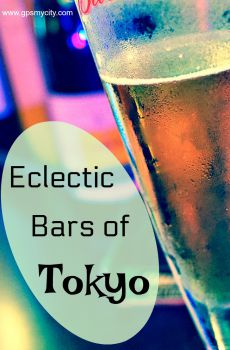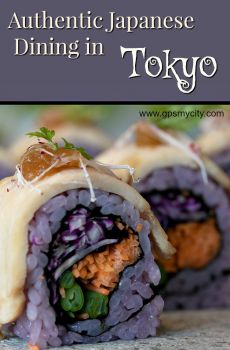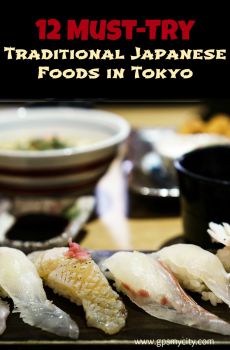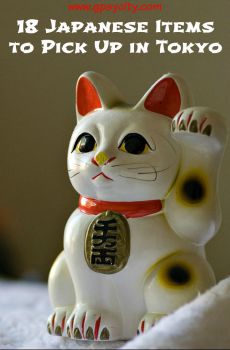Kaminarimon Gate (Thunder Gate), Tokyo
Behold the Kaminarimon-the dramatic, lantern-swinging, statue-guarded welcome mat to Tokyo’s Senso-ji Temple. Literally translating to “Thunder Gate”, this full-blown entrance experience is bold, iconic, and packing centuries of history under its massive red lantern.
This legendary landmark was first built way back in 942-yes, nine-freakin’-forty-two-by a samurai named Taira no Kinmasa. It had moved around a bit since then (because gates also have their dreams) before landing in its current spot in 1635. Sadly, it went up in smoke a few years later-in 1639-but was fortunately resurrected! The shogun Tokugawa Iemitsu made sure it came back better than ever. Furthermore, in 1960, it had another facelift-a sleek renovation that gave us the Kaminarimon we see today.
Standing a proud 11+ meters tall and just as many meters wide, it’s flanked by four divine bouncers. Up front: Fujin, the God of Wind, and Raijin, the God of Thunder-because “welcome” sounds more convincing if reinforced by a stare down from such a weather duo. On the flip side, you’ve got Tenryu and Kinryu, Buddhist protectors offering peace, health, and a sprinkle of good fortune.
Center stage is a giant, red paper lantern called a Chochin, so big it could probably have its own postal code. Donated by none other than the founder of Panasonic, it bears the name “Kaminarimon” on the front, while the gate’s official title, “Furaijinmon,” is inscribed on the back. Oh, and don’t miss the wooden dragon at the base. Fancy stuff.
Ultimately, this gate is an absolute must-snap photo op, especially if you're hunting for that "I went to Tokyo" kind of shot. Plus, the area around it is a treasure trove of tasty street eats and local charm.
Tip:
Catch it at night when the lantern glows gloriously, the crowd dips, and the Thunder Gate turns into a calm, magical beacon in the heart of Asakusa.
This legendary landmark was first built way back in 942-yes, nine-freakin’-forty-two-by a samurai named Taira no Kinmasa. It had moved around a bit since then (because gates also have their dreams) before landing in its current spot in 1635. Sadly, it went up in smoke a few years later-in 1639-but was fortunately resurrected! The shogun Tokugawa Iemitsu made sure it came back better than ever. Furthermore, in 1960, it had another facelift-a sleek renovation that gave us the Kaminarimon we see today.
Standing a proud 11+ meters tall and just as many meters wide, it’s flanked by four divine bouncers. Up front: Fujin, the God of Wind, and Raijin, the God of Thunder-because “welcome” sounds more convincing if reinforced by a stare down from such a weather duo. On the flip side, you’ve got Tenryu and Kinryu, Buddhist protectors offering peace, health, and a sprinkle of good fortune.
Center stage is a giant, red paper lantern called a Chochin, so big it could probably have its own postal code. Donated by none other than the founder of Panasonic, it bears the name “Kaminarimon” on the front, while the gate’s official title, “Furaijinmon,” is inscribed on the back. Oh, and don’t miss the wooden dragon at the base. Fancy stuff.
Ultimately, this gate is an absolute must-snap photo op, especially if you're hunting for that "I went to Tokyo" kind of shot. Plus, the area around it is a treasure trove of tasty street eats and local charm.
Tip:
Catch it at night when the lantern glows gloriously, the crowd dips, and the Thunder Gate turns into a calm, magical beacon in the heart of Asakusa.
Want to visit this sight? Check out these Self-Guided Walking Tours in Tokyo. Alternatively, you can download the mobile app "GPSmyCity: Walks in 1K+ Cities" from Apple App Store or Google Play Store. The app turns your mobile device to a personal tour guide and it works offline, so no data plan is needed when traveling abroad.
Kaminarimon Gate (Thunder Gate) on Map
Sight Name: Kaminarimon Gate (Thunder Gate)
Sight Location: Tokyo, Japan (See walking tours in Tokyo)
Sight Type: Attraction/Landmark
Guide(s) Containing This Sight:
Sight Location: Tokyo, Japan (See walking tours in Tokyo)
Sight Type: Attraction/Landmark
Guide(s) Containing This Sight:
Walking Tours in Tokyo, Japan
Create Your Own Walk in Tokyo
Creating your own self-guided walk in Tokyo is easy and fun. Choose the city attractions that you want to see and a walk route map will be created just for you. You can even set your hotel as the start point of the walk.
Ginza Shopping Tour
Often compared with New York's Fifth Avenue, Ginza is the most luxurious shopping district in Tokyo. Its two main avenues running through the area, Chuo-dori Street and Harumi-dori Street, are lined with high-end boutiques, enormous department stores, and flagship stores of renowned international brands carrying a wealth of merchandise, from fashion and jewelry to electronics and cosmetics.
... view more
Tour Duration: 1 Hour(s)
Travel Distance: 1.6 Km or 1 Miles
... view more
Tour Duration: 1 Hour(s)
Travel Distance: 1.6 Km or 1 Miles
Shinjuku Walking Tour
Known as the best entertainment district in Tokyo, Shinjuku abounds in venues where visitors can play, eat, and shop to their hearts' content all day long. Besides the endless list of fun, shopping, and dining options available, the district also offers some truly amazing sightseeing opportunities which are often underrated.
One of its iconic landmarks is the two towers of the... view more
Tour Duration: 1 Hour(s)
Travel Distance: 2.1 Km or 1.3 Miles
One of its iconic landmarks is the two towers of the... view more
Tour Duration: 1 Hour(s)
Travel Distance: 2.1 Km or 1.3 Miles
Tokyo Imperial Palace Walking Tour
Welcome to Tokyo’s greenest royal secret-The Imperial Palace-a majestic sprawl of tradition, tranquility, and top-tier landscaping. This is where Japan’s Emperor hangs his crown (figuratively speaking), nestled right in the city’s beating heart and surrounded by moats like something straight out of a storybook... or a really classy samurai movie.
Now, before you grab your crown and march... view more
Tour Duration: 2 Hour(s)
Travel Distance: 2.7 Km or 1.7 Miles
Now, before you grab your crown and march... view more
Tour Duration: 2 Hour(s)
Travel Distance: 2.7 Km or 1.7 Miles
Shibuya Walking Tour
Ah, Shibuya... If Tokyo were a giant party, this district would be the dance floor. A neon-lit playground where fashion-forward teens, pop culture fiends, and wide-eyed tourists collide in a kaleidoscope of color, style, and pure urban energy.
But before it became Japan’s trendsetting capital, Shibuya had a different kind of ruling class-the Shibuya clan. Back in the 1160s, they ran this... view more
Tour Duration: 2 Hour(s)
Travel Distance: 3.9 Km or 2.4 Miles
But before it became Japan’s trendsetting capital, Shibuya had a different kind of ruling class-the Shibuya clan. Back in the 1160s, they ran this... view more
Tour Duration: 2 Hour(s)
Travel Distance: 3.9 Km or 2.4 Miles
Ueno Park Walking Tour
Ueno Park is Tokyo’s ultimate mashup of history, nature, and culture! It started as part of the powerful Kanei-ji Temple during the Edo period, which lasted from 1603 to 1868. Back then, samurais roamed and shoguns ruled the country. In the 1870s, as Japan embraced modernization, the area was gentrified, turning into a public park. Today, it's a major attraction for travelers craving both a... view more
Tour Duration: 2 Hour(s)
Travel Distance: 3.9 Km or 2.4 Miles
Tour Duration: 2 Hour(s)
Travel Distance: 3.9 Km or 2.4 Miles
Asakusa District Walking Tour
Asakusa - Tokyo’s delightful time machine with a modern metro stop. This is one of the rare areas in the city where you will find narrow alleys, traditional shops, temple markets, and geisha whispers still echoing off the rooftops. Think of it as Old Tokyo in HD.
Back in the Edo period (between 1603 and 1868), Asakusa got its groove thanks to some very rich guys - the rice storehouse keepers... view more
Tour Duration: 1 Hour(s)
Travel Distance: 1.1 Km or 0.7 Miles
Back in the Edo period (between 1603 and 1868), Asakusa got its groove thanks to some very rich guys - the rice storehouse keepers... view more
Tour Duration: 1 Hour(s)
Travel Distance: 1.1 Km or 0.7 Miles
Useful Travel Guides for Planning Your Trip
Eclectic Bars of Tokyo
Time to tap glasses and share laughs in Tokyo, a city of wondrous variety! In this app is an insider's guide to attractive drinking bars, and places nearby that are worthy experiences (theatres, shrines, shopping districts, etc).
Each bar has been carefully chosen throughout this endless...
Authentic Japanese Dining in Tokyo
Tokyo is home to literally a million eating places, so finding a truly authentic Japanese style restaurant with an English language menu can be rather tricky. We have compiled a list of easy to find Japanese style restaurants covering a range of culinary specialties to make your taste-buds tingle...
12 Must-Try Traditional Japanese Foods in Tokyo
Cuisine is an integral part of any local culture, and no trip to Tokyo is complete without tasting the authentic, Tokyo-made Japanese food. This directory offers information about the traditional dishes and drinks available in Tokyo to help visitors better understand the local food culture and make...
Tokyo Souvenirs: 18 Authentic Japanese Products to Buy in Tokyo
The list of the delights of Tokyo is long and being exposed to just some of them, at some point, can make one addicted (just as the Charles Winchester III character from the M.A.S.H. series). Still, you can always "prolong" the experience and enjoy the effects of it more, if bring home...
